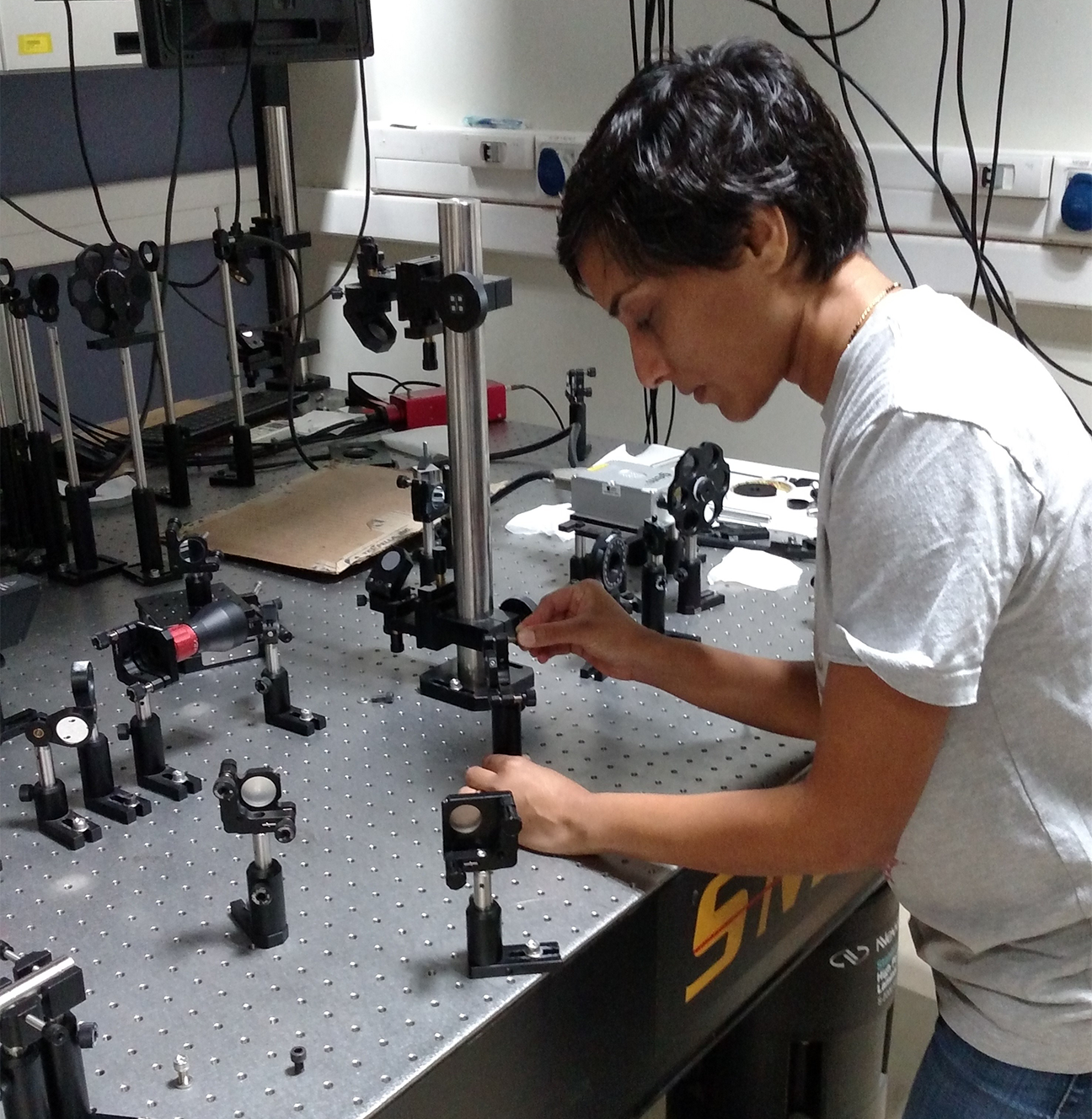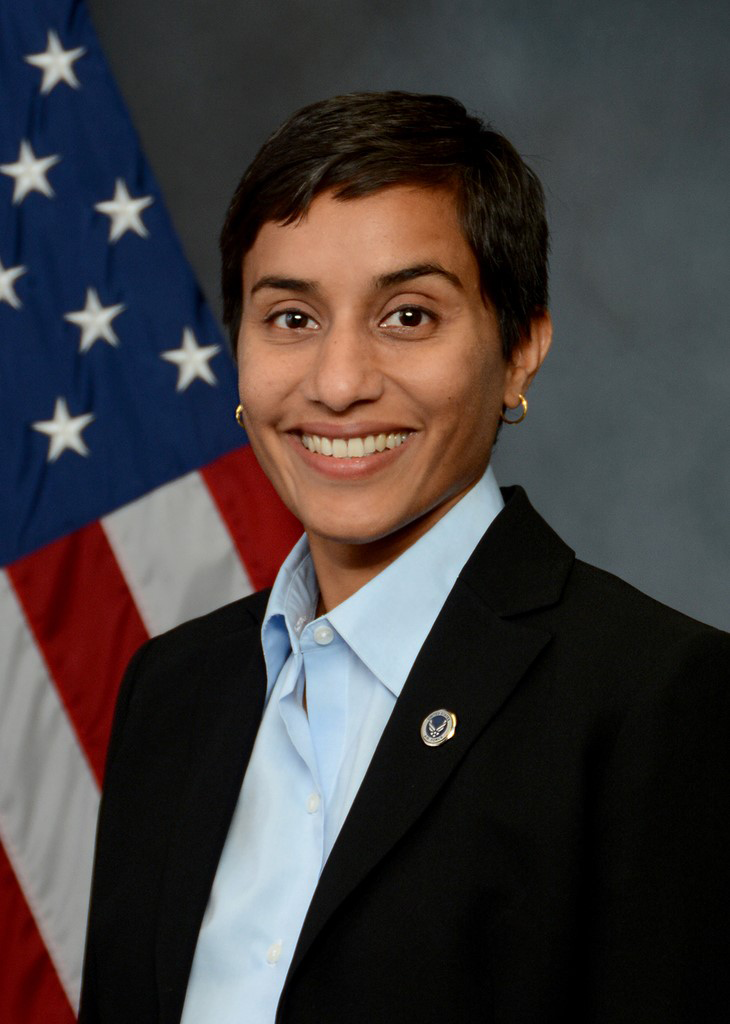AFRL engineer highlights illuminating photonics work in Lab Life podcast
WRIGHT-PATTERSON AIR FORCE BASE, Ohio (AFRL) — Dr. Monica Allen, principal research electronics engineer from the Air Force Research Laboratory’s Munitions Directorate at Eglin Air Force Base, Florida, is the featured guest on AFRL’s “Lab Life” podcast, which is now available.
“Lab Life” brings listeners behind the scenes with Department of the Air Force scientists, engineers and professionals who are developing tomorrow’s technologies today.
In this episode, Allen highlights her field of expertise, discusses her latest projects, explores her approach to teamwork and discusses why she moved to the U.S. and pursued a career in science.
“AFRL has supported me, and allowed me to achieve my dreams and pursue extraordinary research that I couldn’t have even dreamed of,” she said.
She revealed that Sept. 11 inspired her to pursue a career in research. A graduate student at the time of the attack, Allen decided to use her talents as a scientist to help warfighters.
“I wanted to contribute and help fight for the freedoms and opportunities I came here for,” she said.
During the podcast, Allen also described her area of expertise for listeners.
“Photonics is the science of light, which is centered around generation, control and detection,” she said, explaining that “photons are particles of light.” This research area is applicable in defense, energy, biomedicine, forensics and many other industries.
Allen explained that her team works radio frequency (microwaves), as well as visible and infrared light (night vision goggles). Her group is exploring plasmonics, which combines electronics (small chips and tiny devices) and photonics (ultrafast speed).
“It sounds super sci-fi, and … it’s really only come to maturation over the last 10 years,” she said.
A plasmonic circuit makes photonics and electronics possible on small devices.
“Our team really is pioneering to create alternate materials to push plasmonics into infrared,” she said, “noting that before those materials were looked at by our team, plasmonics only really worked with UV and visible light.”
Her research team is also expanding microwave research technology; but, not the typical research, rather complex and innovative approach to combine technologies.
“We want to integrate the best [features] of RF or radio frequency,” she said, referring to the fact that “it’s cheap to fabricate and measure with the extremely fast speeds of optics.” The goal is to “find broad application in sensing, signal control processing, metrology, and so forth.”
Allen noted how accuracy, weight and cost are critical factors. With this in mind, her team focuses on implementing photonics and answering the demand for high speed detection and imagery; timing and sensing; and for testing electronics that make smart munitions secure, helping to build trust into these chips and systems.
“Photonics provides a path to not only test/detect tampering but also enable hardware assurance,” she said. “It can also provide a safe path to monitoring the health of our weapons as they are stored and transported.” She described photonics as “an encompassing technology that has broad applications.”
During the podcast, Allen also explored her approach to working with a team of scientists and engineers.
“I find that mixed perspectives always come up with the most out-of-the-box solutions with wider impact,” she said.
When her team completes brainstorming, they meet in the lab and start fabricating or characterizing designs to quantify performance and then find ways to improve it. She said that her group works in a constant feedback loop.
“What has really led to the success … is the tip-to-tip execution of research that the team conducts,” she said. She defined the phrase “tip-to-tip” as “keeping an eye on the needs of the warfighter and functionality that they may not have thought of yet.”
“This tip-to-tip, or feedback loop, allows the team to have ownership and satisfaction in seeing the project come to completion. It gives them a unique insight into every step of the process,” Allen said.
Allen also discussed her recent contributions to a book called “Women in Aerospace Materials,” advising others to “aim for the sky.” She asserted that since “we are working for the United States Air Force, we need to fly high,” noting “it’s closer than you think.”
She also advocated for mentorships and encouraged listeners to support their colleagues and “help them along the way.”
“It really changes your perspective when somebody takes the time to critique your work,” she said. “It’s key to “take that [feedback] to improve yourself.”
“AFRL really is like my second family,” she said. “They have supported me and helped me to achieve my dreams.”
For those interested in listening to the full episode, this “Lab Life” podcast is available on multiple platforms.
Stream or download at the Defense Visual Information Distribution Service website at
https://www.dvidshub.net/audio/68778/lab-life-episode-63-illuminating-photonics-plasmonics
Stream through the Air Force Materiel Command mobile app on AF Connect
Lab Life on Apple podcasts is available here: https://itunes.apple.com/us/podcast/id1455263736
Listen on Stitcher by visiting: https://www.stitcher.com/show/lab-life/episode/lab-life-episode-63-illuminating-photonics-plasmonics-201754039
Be sure to follow AFRL on social media at Facebook, Twitter, LinkedIn, Instagram and YouTube @afresearchlab.

Dr. Monica Allen, principal research electronics engineer from the Air Force Research Laboratory’s Munitions Directorate, conducts photonics setup and measurement in the lab at Eglin Air Force Base, Florida. Allen was recently a featured guest on AFRL’s “Lab Life” podcast, which is now available.

Dr. Monica Allen, principal research electronics engineer from the Air Force Research Laboratory’s Munitions Directorate at Eglin Air Force Base, Florida, is the featured guest on AFRL’s “Lab Life” podcast, which is now available. In the episode, Allen highlighted her field of expertise, discussed her latest projects, explored her approach to teamwork and discussed why she moved to the U.S. and pursued a career in science.
